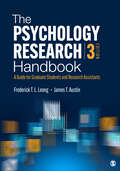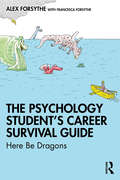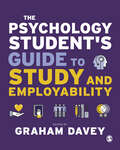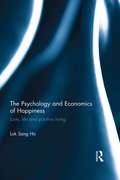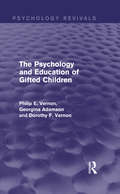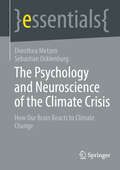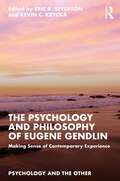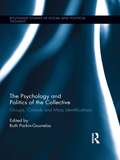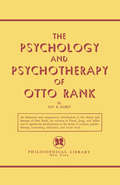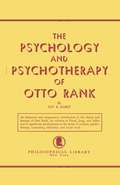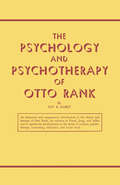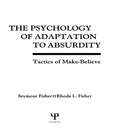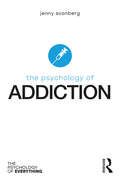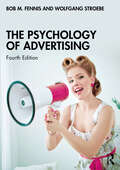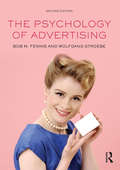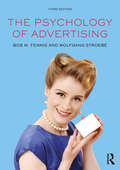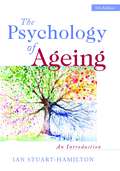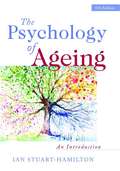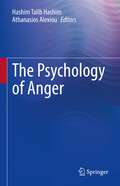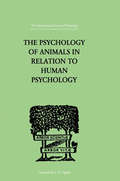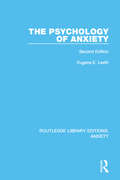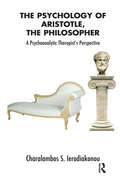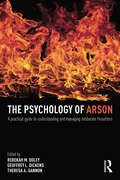- Table View
- List View
The Psychology Research Handbook: A Guide for Graduate Students and Research Assistants
by James T. Austin Frederick T. L. LeongIn the Third Edition of The Psychology Research Handbook editors Frederick T. L. Leong and James T. Austin have assembled experienced expert researchers to provide graduate students and research assistants with a comprehensive framework for conducting many types of psychology research. The book is organized around the idea of a "research script," following the step-by-step process of research planning, design, data collection, analysis, and disseminating research. Many chapters are coauthored by advanced graduate students to give their fellow students a sense of real-world research, adding to the clarity and practicality of many chapters. Students and instructors alike will appreciate chapters on topics typically missing from introductory methods texts, including applying for research grants, dealing with journal editors and reviewers, working within research teams, and conducting cross-cultural research. Structures such as recommended readings and exercises guide students to develop and expand their research skills. New chapters include Power and Evidence, IRB as Critical Collaborators in Research, Alternative Data Collection Strategies, Structural Equation Modeling and Replicability and Reproducibility. A comprehensive, easy-to-understand guide to the entire research process, this book quickly and efficiently equips advanced students and research assistants to conduct a full research project.
The Psychology Research Handbook: A Guide for Graduate Students and Research Assistants
by James T. Austin Frederick T. L. LeongIn the Third Edition of The Psychology Research Handbook editors Frederick T. L. Leong and James T. Austin have assembled experienced expert researchers to provide graduate students and research assistants with a comprehensive framework for conducting many types of psychology research. The book is organized around the idea of a "research script," following the step-by-step process of research planning, design, data collection, analysis, and disseminating research. Many chapters are coauthored by advanced graduate students to give their fellow students a sense of real-world research, adding to the clarity and practicality of many chapters. Students and instructors alike will appreciate chapters on topics typically missing from introductory methods texts, including applying for research grants, dealing with journal editors and reviewers, working within research teams, and conducting cross-cultural research. Structures such as recommended readings and exercises guide students to develop and expand their research skills. New chapters include Power and Evidence, IRB as Critical Collaborators in Research, Alternative Data Collection Strategies, Structural Equation Modeling and Replicability and Reproducibility. A comprehensive, easy-to-understand guide to the entire research process, this book quickly and efficiently equips advanced students and research assistants to conduct a full research project.
The Psychology Student’s Career Survival Guide: Here Be Dragons
by Alex ForsytheThe Psychology Student’s Career Survival Guide is designed to aid students in identifying their ideal career pathway and imbue them with the right tools and skills to not only achieve their desired job but to progress and thrive within the workplace. The first half of the book focuses on how to find and get a suitable job. The remaining chapters explore gaining success in the workplace in terms of personal growth, navigating criticism, workplace relations and the critical job assignments that every graduate should pursue. Forsythe, an experienced organisational psychologist, helps students recognise and apply the acquired psychological skill set to develop a personal brand, increase personal visibility and develop professional networks. This smooths the transition from university into the world of work by developing effective working practices that will support personal performance and that of the workplace. This book can also serve as a practical guide for academics looking to bridge the gap between the developing student at university and demands of their future employers. It explicitly calls for vocational elements such as communication, team-working, goal setting and planning within the curriculum. This engaging book comes with an abundance of resources to support students' individual development and to help academics run workshops. These resources include tool kits which include self-diagnostic tools and strengths finders, networking skill development, job search strategies, difficult interview questions, personal branding and so on. This is an essential text for psychology students at all levels looking for employability guidance and for psychology academics who are seeking supportive resources and guidance on helping students achieve their career ambitions.
The Psychology Student’s Guide to Study and Employability
by Graham DaveyHow does a Psychology degree work? Where will it lead me? What skills are employers looking for? Psychology is one of the most popular undergraduate degree subjects in the UK, which is no surprise given the wide range of transferrable skills it offers. But how to translate these skills into job opportunities? And which career paths to explore? If you are considering studying psychology, or you are already a psychology student looking at your next steps, this book is for you. Written by leading academics, this handy guide interweaves both study skills and employability skills, providing advice across all three years of your course and talking you through the different options open to you after graduation. From writing essays to revising for exams, and from careers in and outside of professional psychology to further academic study, this book covers everything a psychology student needs to know – even how to make the most of your social life! Graham Davey is Emeritus Professor of Psychology at the University of Sussex.
The Psychology Student’s Guide to Study and Employability
by Graham DaveyHow does a Psychology degree work? Where will it lead me? What skills are employers looking for? Psychology is one of the most popular undergraduate degree subjects in the UK, which is no surprise given the wide range of transferrable skills it offers. But how to translate these skills into job opportunities? And which career paths to explore? If you are considering studying psychology, or you are already a psychology student looking at your next steps, this book is for you. Written by leading academics, this handy guide interweaves both study skills and employability skills, providing advice across all three years of your course and talking you through the different options open to you after graduation. From writing essays to revising for exams, and from careers in and outside of professional psychology to further academic study, this book covers everything a psychology student needs to know – even how to make the most of your social life! Graham Davey is Emeritus Professor of Psychology at the University of Sussex.
The Psychology and Economics of Happiness: Love, life and positive living
by Lok Sang HoMuch attention has been given to the economics of everyday life, which typically applies economic principles to the analysis of the different choices that people face under different situations. Yet there are hardly any books on the economics of life—an economics that takes the finite lifespan as the starting point and that looks at how one can maximize the subjective value from life given the constraint of the limited lifespan. In this volume, Lok Sang Ho suggests that the lack of progress in happiness among developed countries despite significant economic growth is due to a deficit of "mental goods", rather than a lack of material goods. The author stresses the role of culture and mental habits in determining the efficacy of gaining mental goods which includes love, a sense of security and autonomy, contentment, self-esteem, self-acceptance, and freedom from anxiety. Drawing on empirical research, the book explores how to invest, work, and consume from a whole life perspective, arguing that every action - consumption, investment, or work - should enhance the total quality of life. This overriding concern about life itself is known as love. The Psychology and Economics of Happiness uses the analytical framework of economists on a subject studied by positive psychologists, drawing both from empirical evidence and from psychological literature. It will be of interest to researchers and academics interested in economic and positive psychology, as well as those from related fields keen to learn more about living fuller, happier lives.
The Psychology and Education of Gifted Children (Psychology Revivals)
by Philip E. Vernon Georgina Adamson Dorothy F. VernonOriginally published in 1977, this book looks at the problem of educating highly intelligent and gifted children, which it felt was of paramount importance to modern society. In the 1970s education increasingly focused on average pupils, and often made excellent provision for handicapped children, the authors felt it all the more important for teachers, parents and educationalists generally to be made aware of the special needs of the bright and talented, and how they could best be catered for. In this book Professor Vernon and his two co-authors discuss the provision of special facilities for the education of these children at the time, particularly with reference to the UK and Canada. The serious losses to society when the gifted and specially talented are ignored or repressed are pointed out and the merits and difficulties of alternative schemes are underlined. Detailed consideration is given to the psychological origins and nature of intelligence (both genetic and environmental) and of creativity and special talents (artistic and scientific), and also to available tests and other techniques for identifying exceptionally able children. The book was particularly intended to help teachers and educational administrators of the time, together with the parents of very bright children.
The Psychology and Neuroscience of the Climate Crisis: How Our Brain Reacts to Climate Change (essentials)
by Sebastian Ocklenburg Dorothea MetzenThis Springer essential addresses the impacts of the climate crisis by integrating various branches of research from psychology and neuroscience. Climate change has massive effects on both the physical and mental health of individuals. The essential describes changes in brain function and structure due to environmental influences and explains the influence of ecological niches on brain evolution. The core part of the book focuses on the effects of the climate crisis on mental health, presents strategies for action in healthcare, and finally provides an outlook into the future of climate neuroscience.
The Psychology and Philosophy of Eugene Gendlin: Making Sense of Contemporary Experience (Psychology and the Other)
by Eric R. Severson Kevin C. KryckaThis book brings together a collection of essays written by scholars inspired by Eugene Gendlin’s work, particularly those interested in thinking with and beyond Gendlin for the sake of a global community facing significant crises. The contributors take inspiration from Gendlin’s philosophy of the implicit, and his theoretical approach to psychology. The essays engage with Gendlin’s ideas for our era, including critiques and corrections as well as extrapolations of his work. Gendlin himself worried that knowing about a problem is too often conflated with actions that might lead to change; the essays in this book point to a form of understanding that is activated, an embodied and immediate way of thinking about today’s problems. Throughout the volume, the contributors creatively engage with Gendlin’s work and its applicability to the complex, pressing crises of our time: the Covid-19 pandemic, environmental/climate issues, racism, sexism, economic inequality, and other factors threatening human persons and communities. Gendlin’s theoretical approach to psychology is naturally interdisciplinary, making this book an essential read for anyone interested in moving to the boundaries where psychology meets philosophy, theology, art, environmental studies, science, technology, and much more.
The Psychology and Politics of the Collective: Groups, Crowds and Mass Identifications (Routledge Studies in Social and Political Thought)
by Parkin-Gounelas RuthWhat are the psychological factors in operation when we form groups or crowds, and how are these affected by socio-historical circumstances? History offers endless examples of different forms of human collectivity, both private and public, small-scale and large: from the primal horde to the modern nuclear family, from the Athenian polis to virtual internet communities. Within the context of shifting social bonds in global culture, this book brings together debates on the left from political philosophy, psychoanalysis, social psychology and media and cultural studies to explore the logic of the formation of collective identities from a new theoretical perspective. Challenging liberal-capitalist models of individualism, as well as postmodern identity politics, analysts here turn to Continental philosophy (Lacan, Derrida, Agamben, Laclau, Badiou, among others) in order to re-think collectivity in relation to questions of agency, alterity, affect, sovereignty, the national imaginary and the biopolitical. In the aftermath of the great mass movements of the twentieth century (Marxist-Leninism, Mao), which resulted in bureaucratic submission and the cult of the State, the fate of our collective identity today raises urgent questions about the future of collaborative activity, the role of mediating institutions in shaping mass psychology, what is at stake in a radical democracy, and what happens in a crowd.
The Psychology and Psychotherapy of Otto Rank
by Fay B. KarpfOtto Rank, an Austrian psychologist, was a protégé of Sigmund Freud who saw in young Rank a gifted mind and drew him into his inner circle. The Psychology and Psychotherapy of Otto Rank is author Fay B. Karpf's historical and comparative introduction to the theory and therapy of Otto Rank, his relation to Freud, Jung, and Adler, and to significant developments in the fields of analysis, psychotherapy, counseling, education, and social work.
The Psychology and Psychotherapy of Otto Rank: An Historical and Comparative Introduction
by Fay B. KarpfOtto Rank, an Austrian psychologist, was a protege of Sigmund Freud, who saw in young Rank a gifted mind and drew him into his inner circle. The Psychology and Psychotherapy of Otto Rank is author Fay B. Karpf s historical and comparative introduction to the theory and therapy of Otto Rank, his relation to Freud, Jung, and Adler and to significant developments in the fields of analysis, psychotherapy, counseling, education, and social work. Fay B. Karpf was one of the earliest Jewish American woman sociologists. Born in Austria in 1893, Karpf eventually immigrated to the United States, where she attended the University of Chicago. She immersed herself in the Chicago School of Sociology, and her first book, American Social Psychology: Its Origins, Development and European Background (1932), was a standard textbook in the field of social psychology. She studied with the psychoanalyst Otto Rank, and she later taught social work at the Training School for Jewish Social Work in New York. After the school unfortunately closed, Karpf moved with her husband to Los Angeles, where she became a practicing counselor and psychotherapist, and she continued contributing to the fields until her death in 1981.
The Psychology and Psychotherapy of Otto Rank: Science And Philosophy, The Psychology And Psychotherapy Of Otto Rank, And Dictionary Of Hypnosis
by Fay B. KarpfThis authoritative study of psychologist Otto Rank covers his groundbreaking work, as well as his connections to Freud, Jung, and others. Austrian psychologist Otto Rank is one of the most influential figures in modern psychotherapy. A protégé́ of Sigmund Freud, he made significant developments in the fields of analysis, psychotherapy, counseling, education, and social work. In The Psychology and Psychotherapy of Otto Rank, social psychologist Fay B. Karpf—who studied with Rank—presents an authoritative analysis of his pioneering work. This historical and comparative introduction to Rank&’s theory and therapy explores his prolific writings, his work with patients, and his relation to Freud and Jung, as well as Alfred Adler and other major figures of the Neo-Freudian school.
The Psychology of Adaptation To Absurdity: Tactics of Make-believe
by Seymour Fisher Rhoda L. Fisher Rhoda FisherThe major goal of this book is to explore and integrate all that is scientifically known about the utility of magical plans and strategies for coping with life's inevitable absurdities. Make-believe has great adaptive value and helps the average individual to function better in cultures saturated with puzzling contradictions. This book traces the origins of pretending (illusion-construction) and the developmental phases of this skill. Further, it analyzes how parents depend on pretending to secure conformity and self-control from their children. It unravels the ways in which make-believe is utilized to defend against death-anxiety and feelings of fragility. It examines the relationship between pretending and the classical defense mechanisms -- and particularly weighs the evidence bearing on the potential protective power of embracing religious beliefs. Finally, it defines the diverse contributions of make-believe to the construction of the self-concept, the defensive maneuvers typifying psychopathology, and the maintenance of somatic health. In short, this book pulls together a spectrum of scientific information concerning the defensive value of illusory make-believe in coping with those aspects of life -- such as death, loss, suffering, and injustice -- that are experienced as unreasonable and beyond understanding. The volume is unique not only in the breadth of the literature it analyzes but also in demonstrating the contribution of make-believe to both the psychological and somatic aspects of behavior. No previous work has documented in such detail and across so many domains how basic the capacity to engage in make-believe is to human adaptation.
The Psychology of Addiction (The Psychology of Everything)
by Jenny SvanbergWhen does a harmless habit become an addition? Why do only some of us get addicted? What can make recovery possible? The Psychology of Addiction is a fascinating introduction to the psychological issues surrounding addiction and the impact they have on social policy, recovery and an addict’s everyday life. The book focuses on drug and alcohol addiction and tackles topics such as whether drug use always leads to addiction and the importance of social networks to recovery. It also looks at how people can become addicted to activities like gambling, gaming and sex. In a society that still stigmatises addiction The Psychology of Addiction emphasises the importance of compassion, and provides a sensitive insight to anyone with experience of addiction.
The Psychology of Advertising
by Wolfgang Stroebe Bob M FennisThe Psychology of Advertising offers a comprehensive overview of theory and research in consumer psychology, exploring how advertising impacts the thoughts, emotions and actions of consumers. It links psychological theories and empirical research findings to real-life industry examples, showing how scientific research can inform marketing practice.This newly updated fourth edition includes a new chapter on social media advertising that considers how brands and social media influencers affects consumer judgement and choice. The book also includes new coverage on the impact of the psychology of advertising on firm performance or consumer behaviour, the application of theory to real-life adverts, and how the psychology of advertising was affected by the covid pandemic. The book offers a comprehensive and state-of-the art overview of psychological theorizing and research on the impact of online and offline advertising and discusses how the traces consumers leave on the Internet (their digital footprint) guides marketers in micro-targeting their advertisements.Now including a glossary of key concepts, updated examples and illustrations, this is a unique and invaluable resource for advanced undergraduate and graduate students of consumer psychology, consumer behaviour, marketing psychology and advertising. It is also suitable for students and professionals in the fields of marketing communication, digital marketing and business.
The Psychology of Advertising
by Wolfgang Stroebe Bob M. FennisAdvertising is a ubiquitous and powerful force, seducing us into buying wanted and sometimes unwanted products and services, donating to charitable causes, voting for political candidates, and changing our health-related lifestyles for better or worse. The impact of advertising is often subtle and implicit, but sometimes blatant and impossible to overlook. This revised and fully updated new edition of The Psychology of Advertising offers a comprehensive and state-of-the-art overview of the psychological findings on the impact of advertising, and discusses the research in the context of recent developments in the fields of social and consumer psychology. Key questions covered in the volume include: What impact does advertising have on consumer behavior? What causes this impact? What are the psychological processes responsible for the effectiveness of advertising? How do consumers make sense of advertising messages? Which messages "get across" successfully and when, and why? How do new online and digital technologies affect consumer judgement and choice? Engagingly written, and including a comprehensive glossary of frequently used concepts, The Psychology of Advertising is a unique and invaluable resource for advanced undergraduate and graduate students, and for researchers and lecturers in social psychology, marketing, and communications. It is also a valuable guide for professionals working in advertising, public health, public services and political communication.
The Psychology of Advertising
by Wolfgang Stroebe Bob M. FennisThe Psychology of Advertising offers a comprehensive exploration of theory and research in (consumer) psychology on how advertising impacts the thoughts, emotions, and actions of consumers. It links psychological theories and empirical research findings to real-life industry examples, showing how scientific research can inform marketing practice. Advertising is a ubiquitous and powerful force, seducing us into buying wanted and sometimes unwanted products and services, donating to charitable causes, voting for political candidates, and changing our health-related lifestyles for better or worse. This revised and fully updated third edition of the Psychology of Advertising offers a comprehensive and state-of-the art overview of psychological theorizing and research on the impact of online and offline advertising and discusses how the traces consumers leave on the internet (their digital footprint) guides marketers in micro-targeting their advertisements. The new edition also includes new coverage of big data, privacy, personalization, and materialism, and engages with the issue of the replication crisis in psychology, and what that means in relation to studies in the book. Including a glossary of key concepts, updated examples, and illustrations, this is a unique and invaluable resource for advanced undergraduate and graduate students and instructors. Suitable for psychology, advertising, marketing, and media courses. it is also a valuable guide for professionals working in advertising, public health, public services and political communication.
The Psychology of Ageing: An Introduction
by Ian Stuart-HamiltonThis well-established and accessible text has been completely revised in this expanded fifth edition. Each chapter has been updated, often extensively, to reflect current thinking, and an important new chapter on death, dying and bereavement has been added. Providing a comprehensive overview of the psychological processes of ageing, the text examines what constitutes older age, and presents the latest theory and research in various domains, including ageing and memory; ageing and language; ageing, personality and lifestyle; and mental illness and ageing. Consideration is given to the problems inherent in measuring the psychological status of older people, and the author looks to the future to answer the question 'what will constitute 'being old'?' This new edition is essential reading for all those working or training to work with older people, and a key text for students.
The Psychology of Ageing: An Introduction (Fifth Edition)
by Ian Stuart-HamiltonThis well-established and accessible text has been completely revised in this expanded fifth edition. Each chapter has been updated, often extensively, to reflect current thinking, and an important new chapter on death, dying and bereavement has been added. Providing a comprehensive overview of the psychological processes of ageing, the text examines what constitutes older age, and presents the latest theory and research in a variety of domains, including intellectual change in later life; ageing and memory; ageing and language; ageing, personality and lifestyle; and mental health and ageing. Consideration is given to the problems inherent in measuring the psychological status of older people, and the author looks to the future to answer the question "what will constitute 'being old'?" This new edition is essential reading for all those working or training to work with older people, and a key text for students.
The Psychology of Anger
by Athanasios Alexiou Hashim Talib HashimThis book discusses anger in psychology, its mechanisms, predisposing factors, precipitating factors, its impacts on brain structure. Anger in psychology is considered from two perspectives – function, and its impacts on physical health. This book is compiled of cutting-edge research, presenting anger in a new, modern and educational way. It presents a mathematical expression for the law of anger, allowing us to understand anger before it truly occurs and to control the anger to prevent its occurrence.The book is highly specialized with anger and considers various perspectives, such as race, historical origin and how these theories align with the modern psychology and neurosciences.
The Psychology of Animals in Relation to Human Psychology
by F. AlverdesThis is Volume I of four in the Comparative Psychology series. First published in 1932, this study offers a short description of parts of animal psychology as are of interest to a wider public, at the same time exhibiting the many and various relations existing between human and animal psychology.
The Psychology of Anxiety: Second Edition (Routledge Library Editions: Anxiety #2)
by Eugene E. LevittOriginally published in 1980, this title builds on the first edition which provided a comprehensive review and evaluation of theory and research on anxiety at the time. In the time between publications there had been many studies of anxiety phenomena and substantial progress in our conceptual understanding of the nature of anxiety and its measurement. The author incorporates those advances in empirical knowledge and new theoretical insights into this second edition. The most important and well-documented empirical findings in anxiety research are emphasized throughout the book, but attention is also called to unresolved theoretical issues and problem areas of the time where there was urgent need for additional research. Although much research has been done since, the authoritative analysis of anxiety phenomena that is presented in this book will still be of interest to medical, social and behavioral scientists and personality theorists, and to mental health workers of all disciplines who are engaged in clinical work with emotionally disturbed persons.
The Psychology of Aristotle, The Philosopher: A Psychoanalytic Therapist's Perspective
by Charalambos IerodiakonouIn this book, the author collects and discusses views and ideas of the ancient philosopher Aristotle which have psychological interest and compares them with today's theories. First, the soul-body problem is presented showing that Aristotle accepts a psychosomatic unity theorizing the human being in a holistic approach. Then the mental functions are described according to the aristotelian definitions, together with their interactions.
The Psychology of Arson: A Practical Guide to Understanding and Managing Deliberate Firesetters
by Rebekah Doley Geoffrey Dickens Theresa GannonThe Psychology of Arson is the first book in its field to focus specifically on contemporary topics relevant to practitioners and professionals working with adolescent and adult deliberate firesetters. Rebekah Doley, Geoffrey Dickens and Theresa Gannon have integrated the very latest information regarding prevalence, theory, research and practice in one accessible resource, and provide practical advice, strategies and techniques in a context of evidence-based research which will be invaluable for all treatment providers who work in the field of deliberate fire setting. Unique features of this book include chapters considering community awareness, strategies, survivors of arson, filicide and suicide by fire, as well as a new treatment model developed on the basis of the latest research in the field. It is divided into four parts: Theories and typologies of firesetting Legal, investigative and preventative issues Assessment and risk assessment of deliberate firesetters Treatment, needs and management of deliberate firesetters The Psychology of Arson provides the first scientist-practitioner model for the treatment of arson offenders. It will be an essential resource for forensic psychiatrists, clinical psychologists and other professionals working with this client group.
